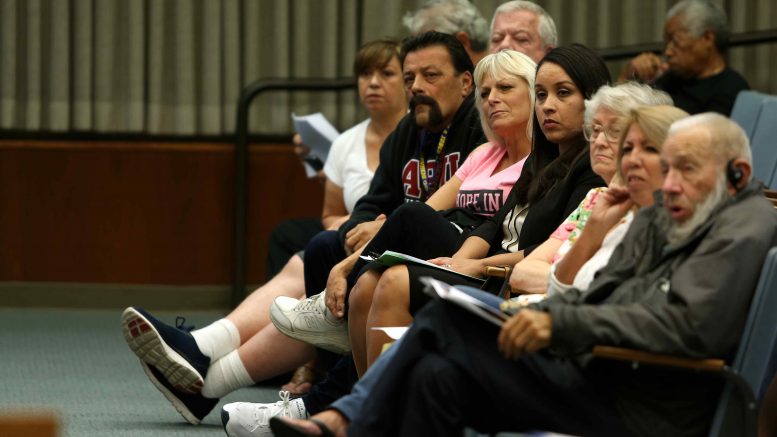WEST COVINA >> Under pressure of a lawsuit challenging the city’s at-large electoral system , the City Council will soon decide whether to fight the suit in court or relent and change the way West Covina residents vote in city elections.
It could also potentially be very expensive.
“It is roughly a $4 (million) to $5 million gamble for the city to take,” said attorney James Touchstone, a lawyer with the city attorney’s law firm, during a presentation at the council’s meeting Tuesday night.
More than 20 residents, including one of the three residents who filed the lawsuit against the city, spoke during the meeting. Many expressed frustration with the civil complaint, which alleges the city’s election method violates the California Voting Rights Act by diluting Latino votes. Some called the lawsuit blackmail.
Others urged the city to oppose the lawsuit, saying the city’s character was at stake. But most also said the city shouldn’t take the gamble.
“I hear the attorney and I know the financial position that this city is in,” said resident Gloria Gandara. “I think we are wasting the money if we go (to court), but I am really upset.”
The complaint, filed last month in Los Angeles County Superior Court, followed a 2009 voter-initiated ballot measure to establish council districts in West Covina.
After the measure failed by a 2-1 margin, the plaintiffs’ attorneys sent two letters, one in 2011 and one in July of this year, demanding that the city abandon at-large methods. They filed the lawsuit on Sept. 21 because they said their clients were tired of waiting for the city to act.
“At-large has been a detriment to this city,” said Alfred Williams, one of the plaintiffs. “There are a lot of people who want things to happen in their neighborhood and they can’t get it done because of at-large.”
The complaint argues racially polarized voting — the only standard the Voting Rights Act requires for proof of a violation — exists in West Covina.
Latinos make up about 53 percent of the city’s population, according to the 2010 Census, but no Latino person currently serves on the City Council. And recent attempts to elect Latinos were unsuccessful.
Others who spoke in favor of council districts pointed out that while the 2009 measure was rejected, turnout was low — less than 19 percent of registered voters in the city cast ballots in that election. According to 2010 census data and election results, approximately 8.5 percent of residents voted on the initiative.
“That does not represent West Covina,” said resident Caroline Salinas. “We need council members who represent all areas of the city … not just the loud few.”
Only one council member, Tony Wu, seemed ready to go to court on the matter Tuesday.
“I do not want to represent my district, I want to represent West Covina,” Wu said. “If we have a chance I really want to fight for this.”
Others said regardless of their feelings about district-based elections, not considering the cost of fighting a lawsuit would be irresponsible.
“If we come back later on and we say, ‘Well, we went for it. Sorry, we lost. We did it on some kind of principle, but now we owe $3 million,$5 million or$6 million’… who’s going to pay for that? It’s the taxpayers,” Mayor James Toma said. “So which police officers, which firefighters, which workers, which streets or parks don’t get taken care of?”
Toma and Councilman Mike Spence said that for some cities, choosing which election system works best can be a clear choice. But for West Covina, a city of about 110,000, that isn’t the case.
“There’s pros and cons to every system whether it’s districts and whether it’s not,” Spence said. “We’re kind of on the cusp I think of going either way but to say that it doesn’t change the character is wrong. It does change the character especially over time but that doesn’t mean it’s the end of the world either one way or another.”
Some residents argued district elections would leave them with fewer voices representing them on the council. In a district system, they said, they’d only have one council member who answers directly to them.
But Toma also noted the system could open up local elections to more potential candidates who simply cannot afford the cost or time of running a citywide election.
“I have faith that there are very good people throughout our entire city who would be very good councilmen (or) councilwomen who just are deterred by the fact that it is so expensive and hard to run and to win an election in this city,” Toma said.
Source: www.sgvtribune.com





Be the first to comment on "Fighting Voting Rights Lawsuit Could Cost West Covina Millions. Will the City Council Take the Gamble?"